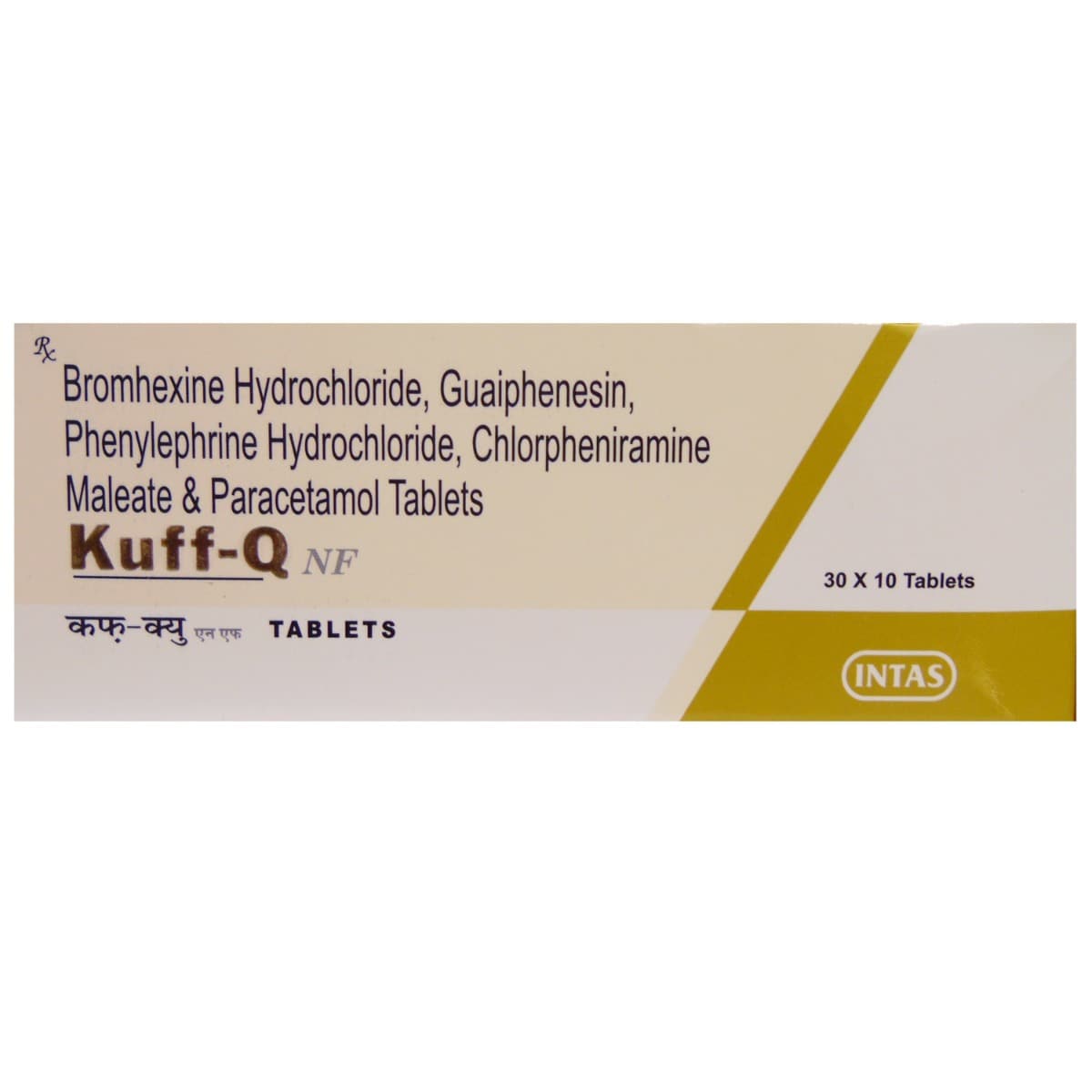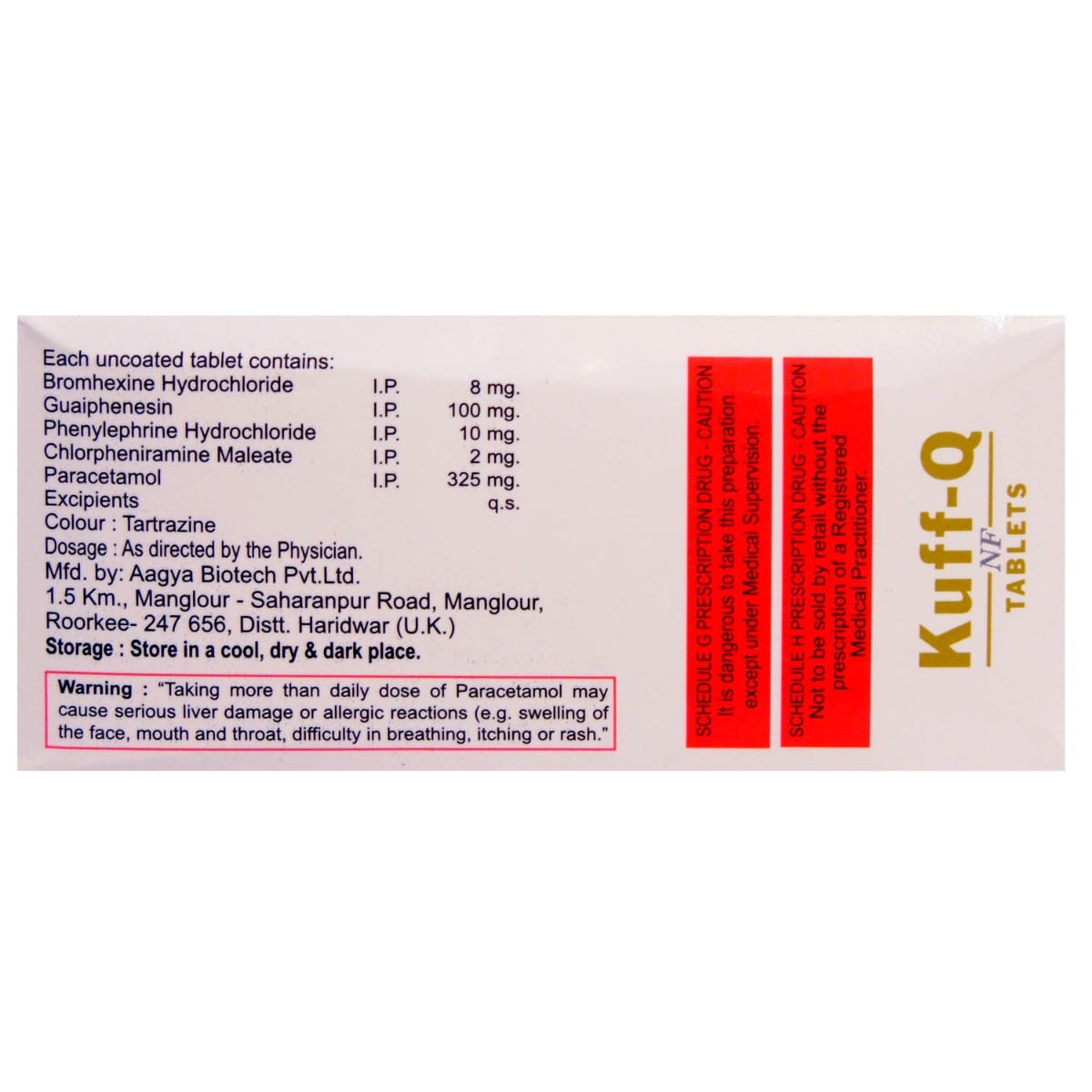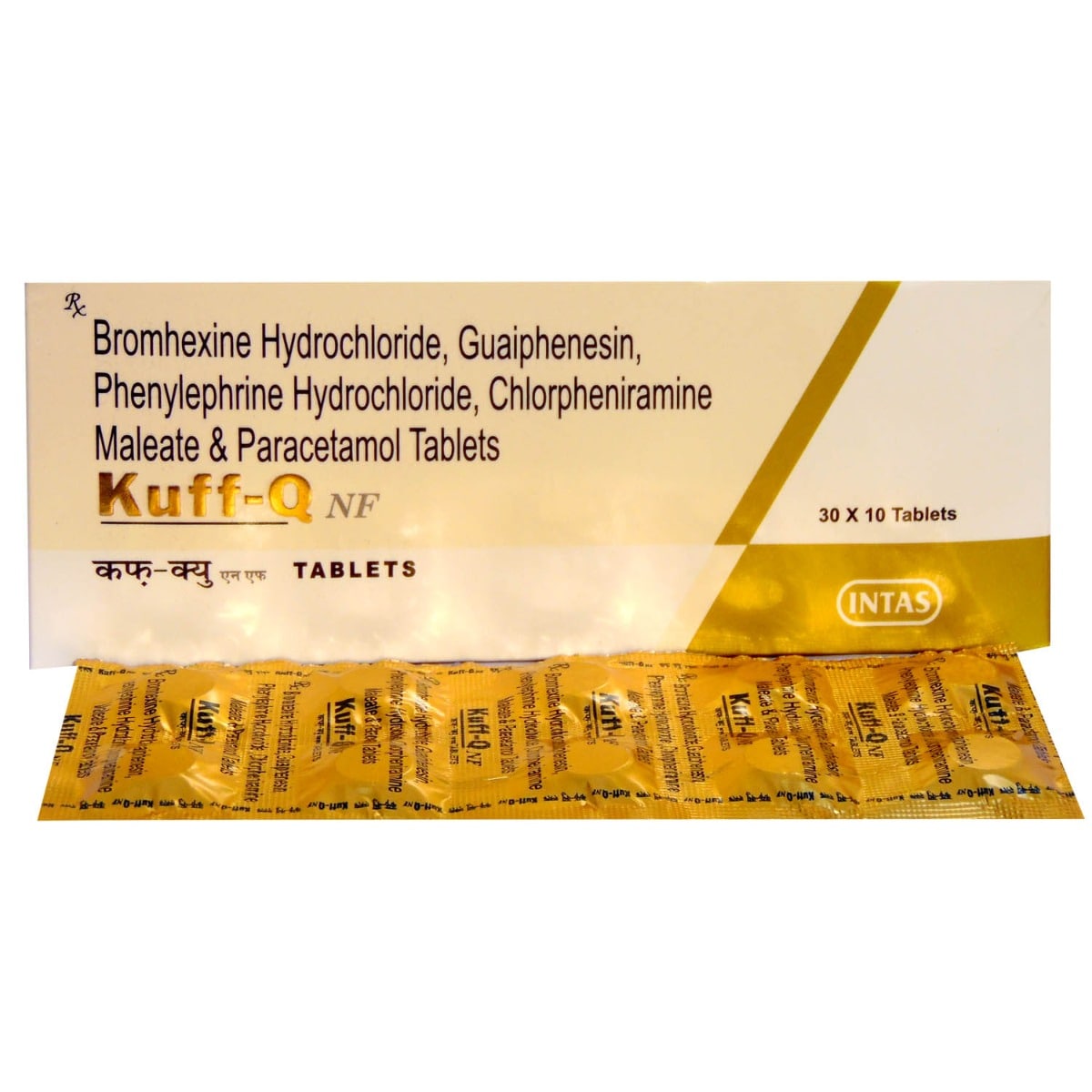Kuff-Q NF Tablet 10's
MRP ₹44.5
(Inclusive of all Taxes)
₹6.7 Cashback (15%)
Provide Delivery Location
Online payment accepted
 Prescription drug
Prescription drugWhats That
About Kuff-Q NF Tablet 10's
Kuff-Q NF Tablet 10's belongs to the class of medication called ‘cough and cold preparations’ primarily used to treat symptoms of common cold and allergies such as sneezing, runny/stuffy nose, fever, headache, body pains, congestion, or watery eyes. The common cold is a respiratory illness affecting the nose and throat. It is mostly caused by viruses known as ‘rhinoviruses’. The virus enters the body through the nose, mouth, or eyes and spreads easily through droplets in the air when the person who is sick sneezes, coughs, or talks.
Kuff-Q NF Tablet 10's contains Chlorpheniramine maleate (antihistamine), Phenylephrine hydrochloride (decongestant), Bromhexine hydrochloride (mucolytic agent), Paracetamol (analgesic and antipyretic) and Guaiphenesin (expectorant). Chlorpheniramine maleate works by blocking the action of histamine, a substance responsible for causing allergic reactions. It helps to provide relief from symptoms of allergy such as sneezing, running nose, watery eyes, itching, swelling, and congestion or stiffness. Phenylephrine hydrochloride works by contracting and narrowing the blood vessels. Thereby, provides relief from congestion and decreases mucus production. Bromhexine hydrochloride works by thinning and loosening phlegm (mucus) in the lungs, windpipe, and nose. Thereby, helps to cough out easily. Paracetamol inhibits the production of certain chemical messengers in the brain known as prostaglandins that are responsible for pain and fever. Guaiphenesin increases the volume of fluid in the airways, reduces the stickiness of mucus, and helps to remove it from the airways.
Take Kuff-Q NF Tablet 10's as prescribed. You are advised to take Kuff-Q NF Tablet 10's for as long as your doctor has prescribed it for you based on your medical condition. Some people may experience drowsiness, nervousness, headache, dizziness, restlessness, diarrhoea, vomiting, nausea, constipation, and dry mouth, nose, or throat. Most of these side effects of Kuff-Q NF Tablet 10's do not require medical attention and gradually resolve over time. However, if the side effects persist or worsen, please consult your doctor.
If you are allergic to Kuff-Q NF Tablet 10's or any other medicines, please tell your doctor. If you are pregnant or breastfeeding, it is advised to inform your doctor before using Kuff-Q NF Tablet 10's. Avoid using Kuff-Q NF Tablet 10's if you have taken medicines such as linezolid, phenelzine, selegiline, rasagiline, isocarboxazid, tranylcypromine, and methylene blue injection in the past 14 days. Drink plenty of fluids while taking Kuff-Q NF Tablet 10's to loosen mucus and protect yourself from being dehydrated or overheated during exercise and in hot weather as Kuff-Q NF Tablet 10's contains chlorpheniramine maleate that decreases sweating and increases the risk of heatstroke.
Uses of Kuff-Q NF Tablet 10's
Directions for Use
Key Benefits
Kuff-Q NF Tablet 10's contains Chlorpheniramine maleate, Phenylephrine hydrochloride, Bromhexine hydrochloride, Paracetamol, and Guaiphenesin. Chlorpheniramine maleate belongs to the class of antihistamines (anti-allergic drugs) that works by blocking the action of histamine, a substance responsible for causing allergic reactions. It helps to provide relief from symptoms of allergy such as sneezing, running nose, watery eyes, itching, swelling, and congestion or stiffness. Phenylephrine hydrochloride is a decongestant that works by contracting and narrowing the blood vessels. Thereby, providing relief from congestion and decreasing mucus production. Bromhexine hydrochloride is a mucolytic agent (cough/sputum thinner) that works by thinning and loosening phlegm (mucus) in the lungs, windpipe, and nose. Thereby, helps to cough out easily. Paracetamol is an analgesic (relieves pain) and antipyretic (reduces fever) that works by inhibiting the production of certain chemical messengers in the brain known as prostaglandins that are responsible for pain and fever. Guaiphenesin belongs to the class of expectorants that works by increasing the volume of fluid in the airways, reducing the stickiness of mucus, and helping to remove it from the airways.
Storage
Drug Warnings
If you are allergic to Kuff-Q NF Tablet 10's or any other medicines, please tell your doctor. If you are pregnant or breastfeeding, it is advised to inform your doctor before using Kuff-Q NF Tablet 10's. Kuff-Q NF Tablet 10's is not recommended for children below 12 years of age. Please do not take more than the prescribed dose of Kuff-Q NF Tablet 10's as it may cause liver damage and cause serious adverse effects. Avoid using Kuff-Q NF Tablet 10's if you have taken medicines such as linezolid, phenelzine, selegiline, rasagiline, isocarboxazid, tranylcypromine, and methylene blue injection in the past 14 days. Drink plenty of fluids while taking Kuff-Q NF Tablet 10's to loosen mucus and protect yourself from being dehydrated or overheated during exercise and in hot weather as Kuff-Q NF Tablet 10's contains chlorpheniramine maleate that decreases sweating and increases the risk of heatstroke. If you have high blood pressure, diabetes, fits, glaucoma, hyperthyroidism (overactive thyroid), or stomach ulcer inform your doctor before taking Kuff-Q NF Tablet 10's.
Drug-Drug Interactions
Drug-Drug Interactions
Login/Sign Up
Taking Kuff-q Nf Tab 10's *** with Propofol may lead to increased levels of Kuff-q Nf Tab 10's *** leading to side effects like high blood pressure.
How to manage the interaction:
Taking Kuff-q Nf Tab 10's *** with Propofol is not recommended, but it can be taken if prescribed by the doctor. Do not discontinue the medications without consulting a doctor.
Taking Furazolidone with Kuff-q Nf Tab 10's *** can cause an increase in high blood pressure.
How to manage the interaction:
Taking Furazolidone with Kuff-q Nf Tab 10's *** is not recommended, it can be taken if prescribed by the doctor. However, if you experience sudden and severe headache, blurred vision, confusion, seizures, chest pain, nausea or vomiting, sweating, lightheadedness, fainting, sudden numbness or weakness (especially on one side of the body), speech difficulties, fever, consult the doctor immediately. It is advised to use Kuff-q Nf Tab 10's *** only after 14 days of stopping Furazolidone.
Co-administration of Kuff-q Nf Tab 10's *** with Sevoflurane can increase the levels of Kuff-q Nf Tab 10's *** and lead to side effects.
How to manage the interaction:
Taking Kuff-q Nf Tab 10's *** with Sevoflurane is not recommended, it can be taken if prescribed by the doctor. Do not discontinue the medications without consulting a doctor.
Taking Tranylcypromine with Kuff-q Nf Tab 10's *** can increase the risk of high blood pressure.
How to manage the interaction:
Taking Tranylcypromine with Kuff-q Nf Tab 10's *** is not recommended, but can be taken together if prescribed by a doctor. However, consult a doctor if you experience severe headache, blurred vision, confusion, seizures, chest pain, nausea or vomiting, sudden numbness or weakness (especially on one side of the body), speech difficulties, fever, sweating, lightheadedness, and fainting Do not discontinue any medications without consulting a doctor.
Co-administration of Selegiline with Kuff-q Nf Tab 10's *** together can raise blood pressure.
How to manage the interaction:
Taking Selegiline with Kuff-q Nf Tab 10's *** is not recommended, it can be taken together if prescribed by a doctor. However, consult a doctor immediately if you experience any symptoms such as severe headache, blurred vision, confusion, fits, chest pain, nausea or vomiting, sudden numbness or weakness (especially on one side of the body), speech difficulties, fever, sweating, lightheadedness, and/or fainting Do not discontinue any medications without consulting a doctor.
Taking Kuff-q Nf Tab 10's *** and Potassium citrate (in tablet or capsule form) together can increase the risk of stomach ulcers, bleeding, and gastrointestinal injury.
How to manage the interaction:
Taking Kuff-q Nf Tab 10's *** with Potassium citrate is not recommended as it can lead to an interaction, it can be taken if prescribed by the doctor. However, if you experience any symptoms such as severe stomach pain, bloating, lightheadedness or dizziness, nausea, vomiting (especially with blood), decreased hunger, or dark, tarry stools, consult the doctor immediately. Do not discontinue any medications without a doctor's advice.
Taking Kuff-q Nf Tab 10's *** and Potassium chloride (in tablet or capsule form) together can increase the risk of stomach ulcers, bleeding, and gastrointestinal injury.
How to manage the interaction:
Taking Kuff-q Nf Tab 10's *** with Potassium chloride it not recommended as it can lead to an interaction, it can be taken if your doctor has prescribed it. However, if you experience any symptoms such as severe stomach pain, bloating, lightheadedness or dizziness, nausea, vomiting (especially with blood), decreased hunger, or dark, tarry stools, consult the doctor. Do not discontinue any medications without a doctor's advice.
Co-administration of Kuff-q Nf Tab 10's *** may decrease the excretion rate of Oxazepam which could result in a higher serum level.
How to manage the interaction:
Although there is a possible interaction between Oxazepam and Kuff-q Nf Tab 10's ***, you can take these medicines together if prescribed by a doctor. Do not stop using any medications without a doctor's advice.
Co-administration of ketamine and Kuff-q Nf Tab 10's *** may decrease the effectiveness of Ketamine which could result in a higher blood level.
How to manage the interaction:
Although taking Ketamine and Kuff-q Nf Tab 10's *** together can evidently cause an interaction, it can be taken if a doctor has suggested it. If you're feeling very sleepy or having trouble breathing, it's important to contact your doctor right away. Do not stop using any medications without a doctor's advice.
Co-administration of Teriflunomide with Kuff-q Nf Tab 10's *** may increase the risk or severity of Liver problems.
How to manage the interaction:
Taking Kuff-q Nf Tab 10's *** with Teriflunomide together can possibly result in an interaction, but it can be taken if a doctor has advised it. Do not discontinue any medications without consulting a doctor.
Drug-Food Interactions
Drug-Food Interactions
Login/Sign Up
Diet & Lifestyle Advise
- Wash your hands with soap and water regularly to prevent the spread of germs.
- Eat plenty of foods rich in good bacteria like yoghurt to improve overall health.
- Drink plenty of fluids to avoid dehydration.
- Gargle with salt water for relief from sore throat.
- Avoid consumption of alcohol with Kuff-Q NF Tablet 10's as it may cause tiredness, drowsiness or lack of concentration.
Side Effects of Kuff-Q NF Tablet 10's
- Drowsiness
- Nervousness
- Headache
- Dizziness
- Restlessness
- Diarrhoea
- Vomiting
- Nausea
- Constipation
- Dry mouth, nose, or throat
Habit Forming
Therapeutic Class
All Substitutes & Brand Comparisons
Author Details
We provide you with authentic, trustworthy and relevant information
Drug-Diseases Interactions
Drug-Diseases Interactions
Login/Sign Up
FAQs
Drug-Drug Interactions Checker List
- DIPHENHYDRAMINE
- CETIRIZINE
- RANITIDINE
- METHYLPHENIDATE
- DULOXETINE
- SERTRALINE
- DEXTROMETHORPHAN
- HYDROCODONE
- ALPRAZOLAM
Special Advise
- Let your doctor know if you are taking sleeping pills or psychotropic drugs. Please do not take any psychotropic medicines with Kuff-Q NF Tablet 10's as it may lead to dizziness and sedation.
Disease/Condition Glossary
Common cold: The common cold is an infection caused by the virus, mainly known as ‘rhinoviruses’, affecting the nose and throat (upper respiratory tract). Children younger than 6 years are at the most significant risk of colds, but healthy adults can also be affected to have 2-3 colds annually. In most cases, cold symptoms are recovered within a week or ten days. However, symptoms might last longer in people who smoke or are exposed to allergens like pollutants, dust, etc. The symptoms of the common cold include sneezing, sore throat, cough, congestion, mild body pains, low fever, mild headache, feeling unwell, and stuffy or runny nose. In some cases, the discharge from the nose may become thicker and yellow or green, which is an indication of bacterial infection.
Allergies: These occur when foreign elements known as allergens attack and invade the body, thereby causing the release of histamines. This chemical messenger 'histamines' causes swelling, inflammation, redness, itchiness, itchy/watery nose and throat, and watery eyes. Allergies generally occur due to chemicals, air pollution, pet danders, dust, pollen hairs, seasonal allergies like hay fever etc.

Have a query?
Alcohol
Safe if prescribed
Avoid consumption of alcohol with Kuff-Q NF Tablet 10's as it may increase the risk of liver damage and cause increased drowsiness, dizziness or difficulty in concentrating. Please consult a doctor before consuming alcohol with Kuff-Q NF Tablet 10's.
Pregnancy
Consult your doctor
The safety of Kuff-Q NF Tablet 10's in pregnant women is unknown. Therefore, it is given to pregnant women only if the doctor thinks the benefits outweigh the risks.
Breast Feeding
Consult your doctor
Kuff-Q NF Tablet 10's may be excreted in breast milk and cause harm to the baby. Therefore, Kuff-Q NF Tablet 10's should not be used in breastfeeding mothers without a doctor’s advice.
Driving
Safe if prescribed
Kuff-Q NF Tablet 10's may cause drowsiness or dizziness in some people. Therefore, drive only if you are alert after taking Kuff-Q NF Tablet 10's.
Liver
Consult your doctor
Take Kuff-Q NF Tablet 10's with caution, especially if you have a history of Liver diseases/conditions. The dose may be adjusted by your doctor as required.
Kidney
Consult your doctor
Take Kuff-Q NF Tablet 10's with caution, especially if you have a history of Kidney diseases/conditions. The dose may be adjusted by your doctor as required.
Children
Safe if prescribed
Kuff-Q NF Tablet 10's may not be recommended for children below 12 years of age. However, please consult a doctor before giving Kuff-Q NF Tablet 10's to children.










_0.jpg?tr=q-85)
